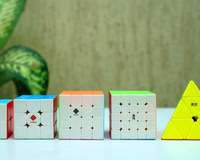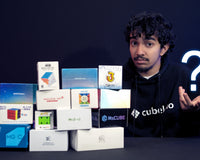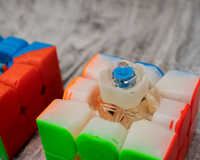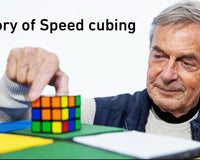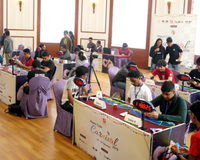INTRODUCTION
Two-sided PLL recognition means being able to recognize the PLL case by looking at only two sides. It can make a huge impact on your solves. By learning this skill, you can avoid doing multiple U moves while recognizing PLL. It can reduce your times by 0.5 to 1 second depending on your current state.
I presume that you are well aware of opposite pairs of colors on a cube. [RED-ORANGE], [WHITE-YELLOW], [BLUE-GREEN]
FEATURES
These are some patterns that occur in almost all cases and are easy to identify.
- Outer 1×2 Bar: 1×2 Bar is towards the outside
- Inner 1×2 Bar: 1×2 Bar is towards the inside

Now let's see how to recognize each PLL from different angles.
Aa, Ab PERM [mirrored]
1. 4-stickered checker pattern; Outer 1×2 bar2. Two inner 1×2 bars; Bookends
[Deduce headlights using tip1]
3. Outer 1×2 Bar; Bookends; Opposite pair 1×2 bar[1×2 Bar and Opposite pair 1×2 bar are in the same direction]
4. Headlights; Opposite pair 1×2 bar
![Aa, Ab PERM [mirrored]](https://cdn.shopify.com/s/files/1/0270/0342/0758/files/image1_e63fd3c2-a860-4f95-8829-000ad6b909b2_480x480.png?v=1663227696)
E PERM
- No features

F PERM
- 1×3 Bar
- 4-stickered checker pattern in the middle(i.e. Excluding far corners), Bookends
[Deduce headlights using tip1]

Ga, Gc PERM [mirrored]
1. Headlights; Outer 1×2 Bar2. Inner 1×2 Bar; Bookends are adjacent colors to the Bar
3. Bookends; Opposite stickers to bookends appear twice
[Ga if opposite stickers that appear twice are towards the right, Gc if opposite stickers that appear twice are towards the left]
4. Headlights; 4-stickered checker pattern(includes headlights)
![Ga, Gc PERM [mirrored]](https://cdn.shopify.com/s/files/1/0270/0342/0758/files/image9_70e1803d-ce3e-42b5-a5e4-acc42e04972d_480x480.png?v=1663227886)
Gb, Gd PERM [mirrored]
1. Headlights with an opposite edge in the middle; Opposite pair 1×2 bar[It can be tricky to differentiate between Gb and Gd from this angle. It is determined using the Opposite pair 1×2 bar. The point is, 1×2 Bar and the Opposite pair 1×2 bar are never in the same direction. If the opposite pair bar is towards the right, then the 1×2 Bar is towards the left. If the opposite pair bar is towards the left, then the 1×2 bar is towards the right.]
2. Inner 1×2 Bar; Bookends Opposite to 1×2 bar3. Outer 1×2 Bar; Bookends; Opposite pair 1×2 bar.
[1×2 Bar and Opposite pair 1×2 bar in different directions]
![Gb, Gd PERM [mirrored]](https://cdn.shopify.com/s/files/1/0270/0342/0758/files/image13_ec9152de-62ea-4fae-a06d-74aff53b995d_480x480.png?v=1663228001)
H PERM
- Headlights on both sides; opposite edges in the middle

Ja, Jb PERM [mirrored]
- 1×3 Bar; 1×2 Bar
- Two 1×2 Bars; Bookends
[Ja perm has 1×2 Bars towards the left, Jb perm has 1×2 Bars towards the right]
![Ja, Jb PERM [mirrored]](https://cdn.shopify.com/s/files/1/0270/0342/0758/files/image2_ea9a0bb2-68f5-4c86-b49a-e84042e1a05c_480x480.png?v=1663228102)
Na, Nb PERM [mirrored]
- Twp 1×2 Bars; No bookends
[Na perm has 1×2 Bars towards the right, Nb perm has 1×2 Bars towards the left]
![Na, Nb PERM [mirrored]](https://cdn.shopify.com/s/files/1/0270/0342/0758/files/image7_079de19c-b678-43d4-9dcf-c5fe7c4bfbb1_480x480.png?v=1663228125)
Ra, Rb perm [mirrored]
- Headlight; 5-stickered checker pattern(includes headlights)
- Headlights; Inner 1×2 Bar; Adjacent edge between headlights
- Outer 1×2 bar; Bookends; Adjacent sticker appears twice
- Bookends; Adjacent stickers to bookends appear twice
![Ra, Rb perm [mirrored]](https://cdn.shopify.com/s/files/1/0270/0342/0758/files/image11_4c97561b-9a93-41f1-854a-96b39b7eb65e_480x480.png?v=1663228152)
T PERM
- Headlight; Opposite edge between headlights; Inner 1×2 Bar
- Outer 1×2 Bar; Bookends; No other features

Ua, Ub PERM [mirrored]
1. 1×3 Bar; Headlights2. Two headlights; Headlights of one side match with the edge of the other side
[It can be tricky to differentiate between Ua and Ub Perms when you don’t see the 1×3 bar. There are two points to remember.
![Ua, Ub PERM [mirrored]](https://cdn.shopify.com/s/files/1/0270/0342/0758/files/image16_b955d3a5-9736-4916-8d5d-cbe6d5dabf56_480x480.png?v=1663228325)
V PERM
- Two inner 1×2 bars; No bookends
- Inner 4-stickered checker pattern; No bookends
- Outer 1×2 bar; No bookends

Y PERM
- Two outer 1×2 Bars; No bookends
- All stickers excluding the corner in the middle two form a checker pattern, like a Y perm; No bookends
- Inner 1×2 Bar; No bookends

Z PERM
- Two headlights; Two different colors appear all over
- Two headlights; Four different colors appear all over

USEFUL TIPS
TIP1
If you see two headlights, then it is a corner solved case[H, U, Z].
If you see headlights on one side, then it is an adjacent swap case[A, F, G, J, R, T].
If you see no headlights but you see bookends, then it is an adjacent swap case[A, F, G, J, R, T].
If you neither see headlights nor bookends, then it is a diagonal corner-swap case[E, N, V, Y]
TIP2
If you see no headlights but you see bookends, then the headlights are on the opposite side to the side which has two opposite stickered corners.
TIP3
I highly recommend trying to figure out your own ways of recognising, as it will make it easier to remember
TIP4
Don’t learn everything at once. You can split the cases into diagonal swap cases[E, N, V, Y], adjacent swap cases[A, F, G, J, R, T] and corners solved cases[H, U, Z]. Learn one set at a time.
TIP5(Important) - How to Train?
The best way to train this skill is to start incorporating it into your solves. When you reach PLL, force yourself not to look at more than two sides. Try to recognize the PLL case just by looking at two sides. At first, it may take 10-20 seconds. Don’t get discouraged by that. Eventually, you will recognize it instantly.
To speed up training, you can select scramble type to PLL on csTimer and do the same.
You can also use CubeSkills PLL recognition trainer, but don’t use it frequently.
Hardhik Varma Kalidindi

















